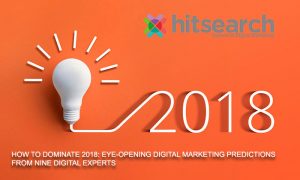 2018 looks like it will be another big year in digital marketing for UK brands and businesses.
2018 looks like it will be another big year in digital marketing for UK brands and businesses.
With economic uncertainty set to continue for the foreseeable future, due to that little thing called Brexit, along with new things to contend with, such as the forthcoming GDPR roll out in May, in addition to all of the standard moving and shaking by tech giants like Google and Facebook, we could be in for a bit of a wild ride!
Influencer marketing, specifically, has been going from strength to strength in recent years as a way for brands to get their products and services in from of their target audience and take advantage of influencer advocacy to acquire new customers. With the fall in print marketing and the rise in routine use of blockers for online browsing, brands need to find alternative ways to catch the attention of increasingly savvy potential customers or clients, rather than relying on the same old techniques, which are no longer bringing results.
Liverpool-based digital marketing agency, Hit Search asked nine contributors from a number of different areas of the industry, including agencies, in-house marketers, SEOs, freelancers and bloggers, for their predictions on how digital marketing, SEO, content marketing and the specific area of outreach and influencer marketing will change or develop in 2018, and what tactics both B2B and B2C brands can best utilise to achieve their objectives.
 Lorrie Hartshorn, Freelance Copywriter, specialising in B2B
Lorrie Hartshorn, Freelance Copywriter, specialising in B2B
“User-generated and user-centred content is non-negotiable”
For me, all signs point to user experience being more important than ever when it comes to creating content.
- Integrated copywriting: I think copywriters who work with design and dev teams are going to be a step ahead in terms of quality output. The nuts and bolts of where your content is hosted is going to be increasingly important: we’re seeing harsher penalties for content that’s not optimised for mobile, and a study by Kissmetrics has shown internet users are getting less patient, with 40% clicking off a website that takes more than three seconds to load.
- Quality over quantity: We always say this, don’t we? But it’s becoming increasingly clear that this really is what B2B consumers in particular want. There’s a marked preference for easily digestible content that readers can dip in and out of. But, at the same time, studies are showing that consumers want to see more authority, and more trustworthiness. So, more data to back up your claims, more quotes from industry leaders, more influential shares, more benchmarking data.
- User-generated and user-centred content is non-negotiable: Customer reviews, case studies with direct quotes, interviews – all these things contribute to a feeling of transparency and trust, and I definitely think that brands (again, B2B in particular) that embrace this kind of content are going to be miles ahead.
- Content as instant value, not as a sales tool: We all know content needs to convert but consumers across the board are becoming more demanding. Clusters of free, easy to access, good quality content – blogs, learning hubs, white papers, education centres, free e-books, email courses – have come to be expected. Internet users aren’t going to tolerate brands that go heavy on the sales messages, particularly in TOFU and MOFU content; they want to read something that offers them value for free, without feeling that something is expected in return.
 Tom Bourlet – Senior Digital Marketer – The Stag Company
Tom Bourlet – Senior Digital Marketer – The Stag Company
“Businesses nowadays have to think bigger”
When working on campaigns, businesses nowadays have to think bigger. Long gone are the days of emailing bloggers all day to push out an infographic. Nowadays, if you want something to really make the grade, you have to think globally. We are hosting the Bubble Football World Cup in 2018, a sporting event we are hoping to get televised, of which a number of celebrities have already been in contact about hoping to be present and representing their country.
While voice search isn’t quite there yet, the error rate is constantly decreasing and the usage is shooting up thanks to Amazon Echo and Google Home. Many specialists are predicting that 50% of all mobile web searches will be through voice search by 2020. This number might end up being slightly north of the final figure, but it certainly highlights we cannot ignore this source of traffic. How we adapt to this change in search may have a heavy impact on our results. But with the success of Amazon Echo, which uses the Bing search engine, it might be time we took Bing seriously again.
Content may not change drastically, but how we perceive content is certainly evolving. Writing in a conversational manner for voice search, including video for people who prefer visual over text, there are many considerations that must be taken if we want optimal results. When we added HTML5 autoplay videos instead of image banners at the top of The Stag Company, we saw a jump in the conversion rate. I can foresee many businesses adding this over time.
I’m most interested to see whether HTTP2 will be adopted by the masses in 2018, this will be one to watch.
 Cornelia Klimek, Product Marketing Specialist at Voices.com
Cornelia Klimek, Product Marketing Specialist at Voices.com
“People don’t want recommendations that are blatant ads”
I predict the influencer market will see a downturn thanks to a perceived lack of authenticity on behalf of the marketer. It worked well initially because customers felt their best friends were telling them the product was awesome.
People don’t want recommendations that are blatant ads. The way to keep this trend going is through how-to videos and other real world applications, showing the product’s use. It will continue to read authentic and will be a better way to sell to a customer, who is seeing the true value of the product while still believing their “bff” uses it.
 Ruth Fishwick, Senior PR & Content Outreach Exec (and blogger), Hit Search
Ruth Fishwick, Senior PR & Content Outreach Exec (and blogger), Hit Search
“How agencies and brands collaborate with influencers will shift from social influence being the catalyst, to becoming engagement driven”
In 2018, I think blogger outreach and how agencies and brands collaborate with influencers will shift from social influence being the catalyst, to becoming engagement driven. Micro influencers will take precedence thanks to their engaged following and ability to create relatable, sharing content, opposed to Instagrammers and ‘bigger bloggers’ with large social followings but little interaction and ROI for brands.
Authentic, credible content with a trusted opinion will help support the buyer’s journey in the long-game through brand awareness and consideration, providing marketers with a precise idea of the audience they’re targeting.
 Dani Peleva, MD at Local Fame
Dani Peleva, MD at Local Fame
“Being merely good is not good enough anymore. Being amazing is what is going to make you stand out from your competitors.”
I believe this particular (influencer marketing) niche will grow. In modern times the users are flooded with content and influencers are the right people to help users segment and differentiate between a good and bad product/ service. People trust influencers and their reach and impact will only get bigger.
However, with so many products and services trying to get influencers on their side, the product and the concept behind will play an even bigger role. Product offering and value will have to be even better, services unique and interesting for influencers to get excited and transfer this excitement to their readers/viewers. Being merely good is not good enough anymore. Being amazing is what is going to make you stand out from your competitors.
 Allie Davies, Blogger & Influencer, tiedyeeyes.com
Allie Davies, Blogger & Influencer, tiedyeeyes.com
“More use of “micro” influencers, with 10,000 followers and less”
I see two things happening in influencer marketing; continued saturation of the “big” bloggers and YouTubers, who will continue to grow and produce more high street collaborations, but also more use of “micro” influencers, with 10,000 followers and less.
With higher engagement rates, less talent agencies to deal with and more influencers to choose from, it seems an obvious move for marketers.
However, just because audiences are smaller, doesn’t mean fees should go out the window. I think we’ll start to see a fairer working environment in the next 12 months for influencers across the board as influencer marketing increases in credibility.
 Rohan Midha, MD at PMYB – Influencer Marketing Agency
Rohan Midha, MD at PMYB – Influencer Marketing Agency
“More regulation”
The influencer marketing industry will grow exponentially, but I think we’ll see a shift in the type of influencers that brands will be working with and more regulation.
 Tim Cameron-Kitchen, Exposure Ninja
Tim Cameron-Kitchen, Exposure Ninja
“Prices continuing to increase for genuinely influential people”
Big changes are needed for #ad attribution on Instagram and I can foresee prices continuing to increase for genuinely influential people.
Matt Jones, SEO Executive, Tutorful (formerly Tutora)
“Influencer marketing/blogger outreach will become a more integral part of marketing strategies”
 Over the next 12 months, it’s very likely that influencer marketing/blogger outreach will become a more integral part of marketing strategies. The ability to multiply your audience reach many times over through the help of influencers, will make them an invaluable tool to use to raise greater brand awareness.
Over the next 12 months, it’s very likely that influencer marketing/blogger outreach will become a more integral part of marketing strategies. The ability to multiply your audience reach many times over through the help of influencers, will make them an invaluable tool to use to raise greater brand awareness.
With social media creating more and more influence over customer buying decisions, using influencer marketing can be a great way to increase conversions and revenue in a short amount of time. Influencer marketing/blogger outreach is definitely a marketing strategy to keep an eye on in 2018!
Source: Hit Search

You must be logged in to post a comment Login